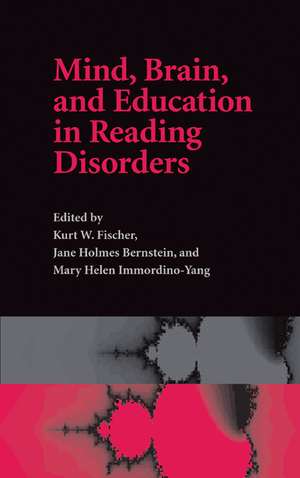Mind, Brain, and Education in Reading Disorders: Cambridge Studies in Cognitive and Perceptual Development, cartea 11
Editat de Kurt W. Fischer, Jane Holmes Bernstein, Mary Helen Immordino-Yangen Limba Engleză Hardback – 16 mai 2007
Preț: 785.17 lei
Preț vechi: 912.99 lei
-14% Nou
Puncte Express: 1178
Preț estimativ în valută:
150.24€ • 156.88$ • 124.06£
150.24€ • 156.88$ • 124.06£
Carte tipărită la comandă
Livrare economică 16-30 aprilie
Preluare comenzi: 021 569.72.76
Specificații
ISBN-13: 9780521854795
ISBN-10: 0521854792
Pagini: 352
Ilustrații: 37 b/w illus. 15 tables
Dimensiuni: 162 x 229 x 27 mm
Greutate: 0.7 kg
Editura: Cambridge University Press
Colecția Cambridge University Press
Seria Cambridge Studies in Cognitive and Perceptual Development
Locul publicării:Cambridge, United Kingdom
ISBN-10: 0521854792
Pagini: 352
Ilustrații: 37 b/w illus. 15 tables
Dimensiuni: 162 x 229 x 27 mm
Greutate: 0.7 kg
Editura: Cambridge University Press
Colecția Cambridge University Press
Seria Cambridge Studies in Cognitive and Perceptual Development
Locul publicării:Cambridge, United Kingdom
Cuprins
Part I. What Is Reading, and What Are Reading Disorders? Looking to Neuroscience, Evolution and Genetics: 1. Towards a grounded synthesis of mind, brain and education for reading disorders: an introduction to the field and this book Kurt W. Fischer, Mary Helen Immordino-Yang and Deborah Waber; 2. An evolutionary perspective on reading and reading disorders Mary Helen Immordino-Yang and Terrence W. Deacon; Essay: brain volume and the acquisition of adaptive capacities Verne S. Caviness; 3. The genetics of dyslexia: what is the phenotype? Albert M. Galaburda and Gordon F. Sherman; Part II. Reading and the Growing Brain: Methodology and History: 4. A brief history of time, phonology, and other explanations of developmental dyslexia Maryanne Wolf and Jane Ashby; 5. Approaches to behavioural and neurological research on learning disabilities: in search of a deeper synthesis Robbie Case; 6. Growth cycles of mind and brain: analyzing developmental pathways of learning disorders Kurt W. Fischer, L. Todd Rose and Samuel P. Rose; Essay: cycles and gradients in development of the cortex Robert W. Thatcher; 7. Brain bases of reading disabilities Francine Benes and Juliana Paré-Blagoev; 8. The neural correlates of reading disorder: functional magnetic resonance imaging Juliana Paré-Blagoev; 9. Patterns of cortical connection in children with learning problems Frank H. Duffy; Essay: the role of experience in brain development: adverse effects of childhood maltreatment Martin H. Teicher; Part III. Watching Children Read: 10. Finding common ground to promote dialogue and collaboration: using case material to jointly observe children's behaviour Jane Holmes Bernstein; 11. Analyzing the reading abilities of four boys: educational implications Susan Brady; 12. First impressions: what four readers can teach us Benita A. Blachman; 13. Analysis of reading disorders from a neuropsychological perspective H. Gerry Taylor; 14. An education/psychological perspective on the behaviors of three children with reading disabilities Joseph K. Torgesen; Part IV. Reading Skills in the Long Term: 15. The importance of comprehension in reading problems and instruction Joseph C. Campione; Essay: bringing reading research to the trenches Sandra Priest Rose; 16. What successful adults with dyslexia teach educators about children Rosalie Fink; 17. Is a synthesis possible? Making doubly sure in research and application David Rose.
Descriere
Explains why reading disorders have been hard to identify and how mind, brain and education can help to understand them.












